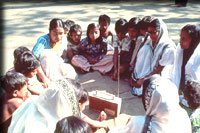 Advances in information and communications technology are changing the global economy. Knowledge is becoming an increasingly important input for production. It is also changing the nature of markets and competition. And it is providing solutions to the consequences of rapid population growth and resource depletion, offering hope for the sustainability of increased economic activity. At the same time, technology poses a serious question about priorities in development. Is it possible for countries lacking in basic services to "leap frog" into the technological age? And what happens to the gap between the haves and the have nots if they do not succeed?
Advances in information and communications technology are changing the global economy. Knowledge is becoming an increasingly important input for production. It is also changing the nature of markets and competition. And it is providing solutions to the consequences of rapid population growth and resource depletion, offering hope for the sustainability of increased economic activity. At the same time, technology poses a serious question about priorities in development. Is it possible for countries lacking in basic services to "leap frog" into the technological age? And what happens to the gap between the haves and the have nots if they do not succeed?
 Telecommunications and Informatics
Telecommunications and Informatics
This comprehensive site contains a range of knowledge on information and communications as well as outlining some of the special challenges faced by developing countries. The following parts of the site may be particularly useful:
 Global Distance EducatioNet
Global Distance EducatioNet
The Global Distance EducationNet (DistEdNet) is a knowledge guide to distance education designed to help clients of the World Bank and others interested in using distance education for human development. This site explains how technology can be used in teaching and learning.
| Special Programs |
 |
Check out the sites of each program. Be prepared to see a lot of practical and technical advice on information technology and development.
 World Links for Development
World Links for Development
The World Links for Development (WorLD) program links students and teachers in secondary schools in developing countries with students and teachers in industrialized countries for collaborative research, teaching and learning programs via the Internet. Check out samples of School Internet projects as well as other links on the site.
 TechNet Program
TechNet Program
TechNet is an initiative designed to encourage understanding of�and promote the use of�science, technology, and information in development. This site contains a collection of publications, case studies, and various working papers that all can be found under Publications.
 InfoDev Program
InfoDev Program
The InfoDev Program was started to help developing countries fully benefit from modern information systems and they give grants to innovative projects around the world to see that this happens. The following sites may be particularly useful:
 Information and Communication Network
Information and Communication Network
Visit this site to explore data on the availability of phone lines, televisions, personal computers, fax machines, and newspapers to
people in countries all over the world. Click on any of the indicators for its definition and ranking of the world's countries. For all other
competiveness indicators, click here.
 Explore these pages from World Development Indicators, 1999 to find data on gender for over 140 of the world's countries.
To view these pages you will need Adobe Acrobat Reader. If you do not have it, you may download it
here for free.
Explore these pages from World Development Indicators, 1999 to find data on gender for over 140 of the world's countries.
To view these pages you will need Adobe Acrobat Reader. If you do not have it, you may download it
here for free.
| Digging Deeper |
 |
 Tackling the Issues
Tackling the Issues
Access to information and communications are closely linked to other issues, like
Education,
Poverty,
and others that in their turn affect the availability of information and quality of
communications.
 Telecommunications
Telecommunications
This site provides a list of journal articles from Privatesector that discuss the challenges and potentials of telecommunications as a private sector enterprise.
 The Internet: A Plus or Minus for the Next Century?
The Internet: A Plus or Minus for the Next Century?
Does the Internet include or exclude? Explore this article on page 9 of the 1998 Summer Edition of the EDI Forum.
 Distance Education: Growth and Diversity
Distance Education: Growth and Diversity
Read this Finance & Development article about the potential benefits of using distance education.
 Educating Through the Mass Media
Educating Through the Mass Media
This chapter from Early Child Development: Investing in the Future discusses how to use mass media, including radio, to teach parenting techniques.
 Education and Technology
Education and Technology
How can computers and other technologies be used in classrooms in developing countries? This web page provides links to papers that explore some of the most pressing and controversial questions involving educational technology�especially as it pertains to developing countries.

